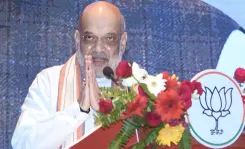Will South Korea Accelerate Trade Deal Negotiations with the US?

Synopsis
Key Takeaways
- South Korea is prioritizing trade negotiations with the U.S. to benefit its automotive industry.
- Tariff reductions on Korean vehicles are a key focus of the discussions.
- The recent U.S.-Japan trade agreement raises concerns for Korean manufacturers.
- Seoul is proposing a significant investment package in exchange for favorable terms.
- Both nations are working to address their differences over the trade deal specifics.
Seoul, Sep 5 (NationPress) South Korea is expediting discussions with the United States to finalize the particulars of the framework trade agreement established between the two countries in late July. This agreement aims to foster equitable competition for the Korean automobile sector within the U.S. market, as stated by officials from the trade ministry.
Earlier today, U.S. President Donald Trump enacted an executive order to formally initiate a trade agreement with Japan, under which a reduced tariff rate of 15 percent will be imposed on Japanese automobiles, according to Yonhap news agency.
This signing has raised apprehensions for Korean automotive manufacturers, as the Seoul government is still actively negotiating with the Trump administration to reconcile differences regarding the specifics of the bilateral framework trade deal finalized on July 30. In this agreement, Washington consented to decrease tariffs on Korean vehicles from 25 percent to 15 percent.
"We will meticulously analyze the details of the trade agreement between the U.S. and Japan while conducting comprehensive and meaningful discussions with the U.S. to protect both national and private industry interests," remarked an official from the Ministry of Trade, Industry, and Energy. "We are aware of the concerns faced by the automobile sector."
Seoul and Washington are reportedly working to resolve their discrepancies over the details of the $350 billion investment proposition put forth by South Korea in return for tariff reductions.
According to South Korean officials, this anticipated investment will primarily consist of loans and guarantees, while the U.S. is pushing for more direct investments.
In parallel, the signing coincides with ongoing discussions between Washington and Tokyo to settle their differences regarding the specifics of a framework trade agreement announced on July 22, just days before South Korea and the United States finalized their deal.
As per the order, the U.S. will reduce tariffs on Japanese automobiles and components from 27.5 percent to 15 percent, a figure that includes the current 2.5 percent tariff along with a global sector-specific duty of 25 percent.









